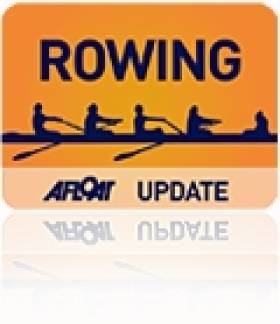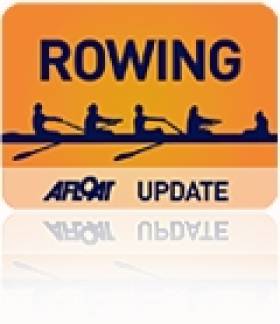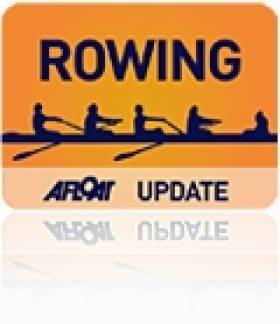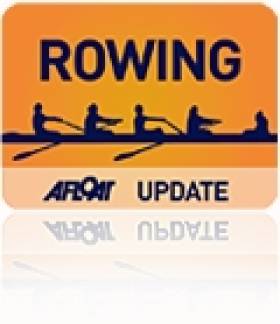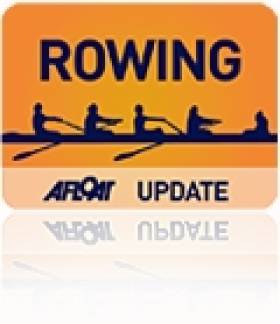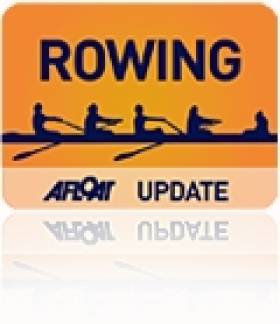Displaying items by tag: Kennedy
Ireland's New Women's Double Fifth in World Rowing Semi-Final
#WRChamps: Ireland’s new double scull of Leonora Kennedy and Monika Dukarska finished fifth in their semi-final at the World Championships in Chungju in Korea this morning and will compete in a B Final on Sunday. The semi-final was won well by Frances Houghton and Victoria Meyer-Laker, with Germany and Denmark filling second and third and taking the resultant places in the A Final. Ukraine took fourth, while Ireland pushed Italy into sixth early in the race and stayed in front of the crew in blue until the finish.
World Rowing Championships, Chungju, Korea, Day Six (Irish interest)
Women
Double Sculls – Semi-Final (First Three to A Final; rest to B Final): 1 Britain (F Houghton, V Meyer-Laker) 7:18.56, 2 Germany (J Lier, M Adams) 7:19.10, 3 Denmark (M Petersen, L Jakobsen) 7:29.30; 4 Ukraine 7:34.27, 5 Ireland (M Dukarska, L Kennedy) 7:39.33, 6 Italy 7:39.50.
Lightweight Single Sculls – C Final (Places 13 to 18): 1 Italy (D Zacco) 8:05.21, 2 Ireland (C Lambe) 8:07.38, 3 Korea (Yoo Jin Ji) 8:08.75, 4 Japan 8:18.46, 5 Singapore 8:24.11, 6 India 8:32.05.
Kennedy and Dukarska Give Ireland Place in World Championship Semis
#WRChamps: Monika Dukarska and Leonora Kennedy reached the A/B Semi-Finals at the World Championships in Korea this morning. The Ireland double scull had to make the top three in their repechage to qualify, and they finished second behind Russia and ahead of Korea, who took the third qualification place. The Russians, who had to give way to Ireland in the heats, were pillar-to-post winners, but the new Ireland crew maintained a steady pace behind them.
The Olympic and World Champion in the men's single sculls, Mahe Drysdale of New Zealand, could only finish fourth in his quarter-final and failed to make the semi-finals.
World Rowing Championships, Day Three (Irish interest)
Women
Double Sculls – Repechage (First Three to A/B Semi-Finals; rest to C Final): 1 Russia (E Potapova, M Krasilnikova) 7:09.81, 2 Ireland (M Dukarska, L Kennedy) 7:12.08, 3 Korea (A Kim, Y Kim) 7:17.95; 4 Taipei 7:44.92, 5 Namibia 9:22.05.
Good Second Half Not Enough for Ireland Women's Double
#WorldRowingChampionships: Ireland’s double scull of Monika Dukarska and Leonora Kennedy took fourth in their heat at the World Rowing Championships in Chungju in Korea this morning and must compete in a repechage to secure a place in the A/B Semi-Finals.
A place in the top three was the target: Lithuania and Denmark were the clear one-two from half way, with Ukraine in third and Ireland and Russia trailing. Dukarska and Kennedy upped their rate in the second half of the race, engaging in a battle with Russia which they won. They overlapped Ukraine in the closing stages but could not head them.
World Rowing Championships, Day Two (Irish interest)
Women
Double Sculls – Heat One (First Three Directly to A/B Semi-Final; rest to Repechage): 1 Lithuania (D Vistartaite, M Valciukaite) 6:52.09, 2 Denmark (M Petersen, L Jakobsen) 6:56.34, 3 Ukraine (A Kravchenko, O Buryak) 7:02.42; 4 Ireland (M Dukarska, L Kennedy) 7:03.92, 5 Russia 7:09.73.
Kennedy and Dukarska Finish Sixth at World Cup Regatta
# ROWING WORLD CUP: Ireland’s new double scull of Leonora Kennedy and Monika Dukarska finished sixth at the World Cup regatta at Dorney Lake. The race was notable for the boat-stopping crab which China suffered at 1750 metres – only to recover and take a bronze medal. Britain won and Denmark were second. Kennedy and Dukarska had not started particularly well, but they recovered well and were up with the field until the middle stages.
World Cup Regatta, Dorney Lake, Day Three (Irish interest)
Men
Lightweight Single Sculls – A Final: 1 Portugal (P Fraga) 6:57.02, 2 Denmark One (S Jensen) 6:59.80, 3 Denmark Two (A Bendtsen) 7:00.24; 4 New Zealand 7:00.69, 5 Germany Two 7:04.66, 6 Ireland (P O’Donovan) 7:06.69.
Lightweight Double Sculls – A Final: 2 Britain (R Chambers, P Chambers)
Single Sculls – A Final: 2 Britain (A Campbell)
Women
Double Sculls – A Final: 1 Britain (F Houghton, V Meyer-Laker) 6:52.60, 2 Denmark (M Petersen, L Jakobsen) 6:53.41, 3 China (D Xu, F Pan) 6:57.81; 4 Germany 6:58.11, 5 Finland 7:01.32, 6 Ireland (M Dukarska, L Kennedy) 7:06.79.
Lightweight Single Sculls – A Final: 1 Austria (M Taupe-Traer) 7:36.62, 2 Germany (L Pless) 7:44.98, 3 Brazil (F Beltrame) 7:46.46; 4 Britain 7:47.40, 5 Ireland (C Lambe) 7:55.06, 6 Hong Kong 7:58.78.
Ireland Women's Crews Qualify for A Finals at World Cup
# ROWING WORLD CUP: Claire Lambe in the lightweight single sculls and the double scull of Leonora Kennedy and Monika Dukarska both won their repechages to progress to A Finals at the World Cup regatta at Dorney Lake today.
Lambe had missed out on direct qualification through her heat when finishing third, but she made certain of an A Final place by leading from the early stages in her second-chance race. Ka Man Lee from Hong Kong was the only serious test for Lambe. She finished second and also qualified for the final.
The double had a very satisfying victory in only their second race as a crew. They were pressed at the end by Finland, but led through all four quarters.
World Cup Regatta, Dorney Lake, Day One (Irish interest)
Men
Lightweight Single Sculls - Heat Two (First Two Directly to A/B Semi-Final; rest to Repechage): 1 Ireland (P O’Donovan) 7:13.89, 2 New Zealand (D Grant) 7:17.37; 3 Hong Kong 7:27.67, 4 Korea 7:28.71, 5 Brazil Two 7:30.92, 6 Japan 7:32.49.
Lightweight Double Sculls – Heat One: 1 Britain (R Chambers, P Chambers) 6:29.86.
Single Sculls – Heat Three: Britain (A Campbell) 7:07.03.
Arms and Shoulders Single Sculls – Heat One (First Directly to Final; rest to Repechage): 4 Ireland (T Kelly) 6:31.23.
Women
Double Sculls – Heat Two (First Two Directly to A Final; rest to Repechage): 1 Britain (F Houghton, V Meyer-Laker) 6:59.96, 2 China Two (D Xu, F Pan) 7:03.91; 3 Ireland (M Dukarska, L Kennedy) 7:15.68, 4 Korea 7:18.48. Repechage (Two to A Final; rest to B Final): 1 Ireland 7:12.18, 2 Finland 7:12.92; 3 China Three 7:16.23, 4 Korea 7:18.27, 5 China One 7:32.84.
Lightweight Single Sculls – Heat Two (First Two Directly to A Final; rest to Repechage): 1 Brazil (F Beltrame) 7:54.85, 2 Britain (R Walczak) 7:59.13; 3 Ireland (C Lambe) 8:07.80, 4 Paraguay 8:29.68, 5 Hong Kong 8:34.62. Repechage (Two to A Final; rest to B Final): 1 Ireland (Lambe) 8:05.22, 2 Hong Kong One 8:07.29; 3 Paraguay 8:18.51, 4 Austria Two 8:23.09, 5 Singapore 8:28.71, 6 Hong Kong 8:35.40.
Kennedy and Dukarska Set for World Cup Repechage
# ROWING WORLD CUP: Ireland’s new double scull of Leonora Kennedy and Monika Dukarska finished third in their heat, one place away from direct qualification for the A Final at the World Cup regatta at Dorney Lake today. Britain won the heat well, and China’s second crew kept Ireland at bay for the second spot. Ireland are set for a repechage this afternoon.
World Cup Regatta, Dorney Lake, Day One (Irish interest)
Men
Lightweight Single Sculls - Heat Two (First Two Directly to A/B Semi-Final; rest to Repechage): 1 Ireland (P O’Donovan) 7:13.89, 2 New Zealand (D Grant) 7:17.37; 3 Hong Kong 7:27.67, 4 Korea 7:28.71, 5 Brazil Two 7:30.92, 6 Japan 7:32.49.
Arms and Shoulders Single Sculls – Heat One (First Directly to Final; rest to Repechage): 4 Ireland (T Kelly) 6:31.23.
Women
Double Sculls – Heat Two (First Two Directly to A Final; rest to Repechage): 1 Britain (F Houghton, V Meyer-Laker) 6:59.96, 2 China Two (D Xu, F Pan) 7:03.91; 3 Ireland (M Dukarska, L Kennedy) 7:15.68, 4 Korea 7:18.48.
Lightweight Single Sculls – Heat Two (First Two Directly to A Final; rest to Repechage): 1 Brazil (F Beltrame) 7:54.85, 2 Britain (R Walczak) 7:59.13; 3 Ireland (C Lambe) 8:07.80, 4 Paraguay 8:29.68, 5 Hong Kong 8:34.62.


























